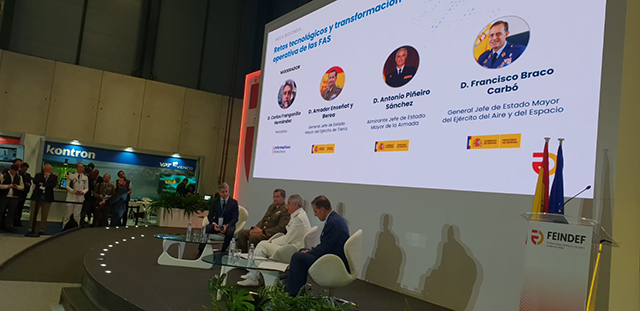Hall 10 of FEINDEF hosted a highly interesting roundtable yesterday, May 12, with the Chiefs of Staff of the Army, Air Force, and Navy. Under the title "Technological Challenges and Operational Transformation in the Armed Forces," the top officials of the Spanish Armed Forces shared their perspectives on strategic and technological issues in a meeting moderated by journalist Carlos Franganillo.
Regarding the technological transformation brought about by the emergence of Artificial Intelligence (AI) in defense, Army General Amador Enseñat y Berea, Chief of the General Staff of the Army (JEME), has drawn attention to the twofold challenge it poses. On the one hand, the ethical challenge, stating that when lethal force is applied, there must always be a human decision behind it, above that of AI. On the other hand, from a legal perspective, it is necessary to update the Geneva and Hague Conventions to consider the impact of new technologies in the combat environment.
Current Conflicts
Current conflicts have highlighted how technology coexists with trenches like those of the First World War; they are intertwined layers. General Amador Enseñat asserts that the impact of technology on classic warfare has made combat scenarios bloodier, with the introduction of, for example, inexpensive and highly lethal UAVs.
In this regard, from the Navy, highlighting the rapid adaptation process the institution is undergoing, Admiral General Antonio Piñeiro Sánchez, Chief of the Navy General Staff, (AJEMA), has pointed out that deterrence is a key element. It is expensive, but undoubtedly cheaper than any conflict. He said that the Navy's deterrence capability is based on three pillars: the Submarine Weapon, the ability to project naval power to land, and the interoperability of the Armed Forces. For his part, Air Force General Francisco Braco Carbó, Chief of the General Staff of the Air and Space Force (JEMA), has stated, in line with the importance of technology, that if there is a conventional war in Ukraine it is because the air defense system has failed, which would have changed the current course of the conflict.
On the other hand, with respect to collaboration with national industry, while the Navy and the Air Force have their "national champions" as benchmark suppliers, Navantia and Airbus respectively, the situation is different when it comes to ground platforms and weapons systems for the Army. The Chief of the General Staff of the Spanish Army also pointed out that many different systems must be integrated within the Army and emphasized the importance of public and private investment in the rearmament process underway, emphasizing that private investment requires a framework of certainty to be implemented.
Training and Recruitment
Regarding recruitment, the Chief of the General Staff of the Army referred to the difficulty of retaining personnel with technological qualifications, given the competition in the civilian sector in terms of conditions and salaries. Turning to reservists with technological profiles could, he said, be one of the options that provides solutions to this situation.
The Chief of the General Staff of the Air and Space Force emphasized, regarding the issue of recruitment, that the cut-off marks for entry into the Academies already show that those who enter have top-level profiles; "they are very good, and we make them better," he said. Regarding training, Admiral General Antonio Piñeiro emphasized the importance of values education, which is more necessary today than ever, he stressed, and how technology is impacting training, citing Navantia's new submarine simulator for the Navy as an example.







